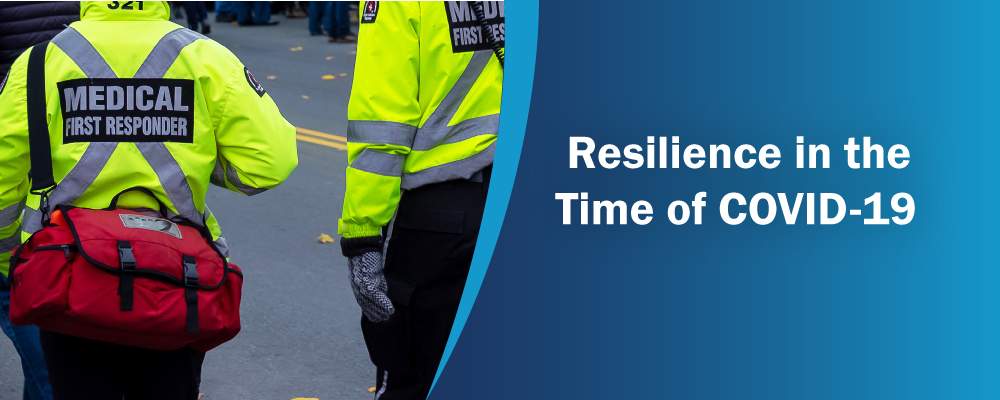Marcy Barnett, NNPHI’s Director of Emergency Preparedness, Response, & Recovery, speaks about the importance of responder resilience in the face of disaster and provides self-care measures we can all benefit from during the latest global crisis and public health emergency: COVID-19.
 Emergency medical services, healthcare, and public health responders serve as the foundation of a community’s ability to respond to and recover from a disaster — this is never more true during an infectious disease outbreak, such as the current coronavirus disease (COVID-19) crisis. While any disaster has the potential to take a toll on the physical and emotional wellbeing of responders, the intensity and expected duration of the COVID-19 outbreak underscores the stress with which this workforce is struggling as they cope with dramatic increases in patients for whom they care.
Emergency medical services, healthcare, and public health responders serve as the foundation of a community’s ability to respond to and recover from a disaster — this is never more true during an infectious disease outbreak, such as the current coronavirus disease (COVID-19) crisis. While any disaster has the potential to take a toll on the physical and emotional wellbeing of responders, the intensity and expected duration of the COVID-19 outbreak underscores the stress with which this workforce is struggling as they cope with dramatic increases in patients for whom they care.
Long hours, shortages in supplies and staffing, the threat of physical harm, and austere working conditions are not uncommon circumstances for disasters responders and health workers. Disasters are, by their nature, anxiety-inducing events, but COVID-19 presents additional burdens for frontline health workers: the worry of being infected and developing the disease and/or exposing family members to the virus, the social isolation that comes from maintaining effective infection control measures, feelings of exhaustion, and the uncertainty surrounding how long the crisis will last.
Mental stress can negatively impact job performance, resulting in poor decision-making and errors that could jeopardize personal safety and the safety of others. Signs of responder stress include unhealthy coping strategies, such as self-medicating with excessive drinking, smoking, burnout, or compassion fatigue. Even well-seasoned responders can experience adverse psychological reactions from high-impact events. In fact, experienced responders may be coping with the accumulation of physical and psychological injury from recurring traumatic situations. What works in the moment – repressing one’s emotions in order to continue the job of taking care of others – does not work for many in the long run. Post-traumatic stress disorder is one possible negative outcome.
Preparing to face emergency situations while protecting oneself from physical and mental injury is an essential and effective coping strategy for responders. The capacity to effectively withstand, adapt to, and recover from difficult situations is known as resilience. Resilient responders have the ability to work through the painful emotions and effects of stressful events and go on with their lives, able to make a meaningful contribution to the next emergency. Responder resiliency requires pre-event planning, training, tools, as well as on-going support that allows workers to manage their stress and be more effective on the job.
Responder resiliency in the face of adversity and disaster depends on a combination of organizational and personal preparedness measures. It is developed by promoting professional competence and connections, communities of practice, and organizational attention to pre- and post-emergency response physical and mental health. A robust program of emergency response training and exercising for health professionals and responders is critical to developing resilient responders. Self-care measures can improve mental wellbeing as well. One technique called “The Pause” encourages responders to stop immediately after a traumatic event and acknowledge what they just experienced. Talking or writing about distressing occurrences can also help responders manage their stress. Proper food, rest, and hydration are a must.
The large-scale disasters of the twenty-first century that began with 9/11 and the anthrax crisis and have continued with Hurricanes Katrina, Rita, Maria, Irma, Michael, and others, the devastating California wildfires, and now the global COVID-19 pandemic have underscored the impact that disasters can have on the wellbeing of responders. Effective pre- and post-event coping strategies are necessary, as well after care for those responders who are suffering from psychological injury. Recovery from the next public health emergency, whether due to a known or novel threat, will depend on responder resilience, an essential component of community preparedness.
Marcy A. Barnett, CEM, REHS, MEP serves as director of the new Emergency Preparedness, Response, and Recovery portfolio of the National Network of Public Health Institutes. As a part of this role, she leads and facilitates the Hurricane Response Hub initiative, a coordinated effort among federal, state, and local public health organizations to facilitate training, technical assistance, and information sharing to enhance ongoing environmental and occupational health recovery in jurisdictions affected by the 2017 hurricanes. This initiative works to improve the resiliency and capabilities of public health systems impacted by hurricanes.
How You Can Get Involved
To request training or to get more information about how the Hurricane Response Hub can help your organization improve its hurricane-related disaster-related health recovery efforts, visit https://nnphi.org/focus-areas-service/hurricane-response-hub/.
For more information on what NNPHI is doing to respond to COVID-19, visit here.
More Articles Related to The Hub Speaks
The Importance of Protecting Your Mental Health: Before, During, and After a Disaster
Leveraging Partnership to Inform and Expand the Bandwidth of Disaster Resiliency
Learning Opportunities: Disaster-Related Resources for COVID-19


